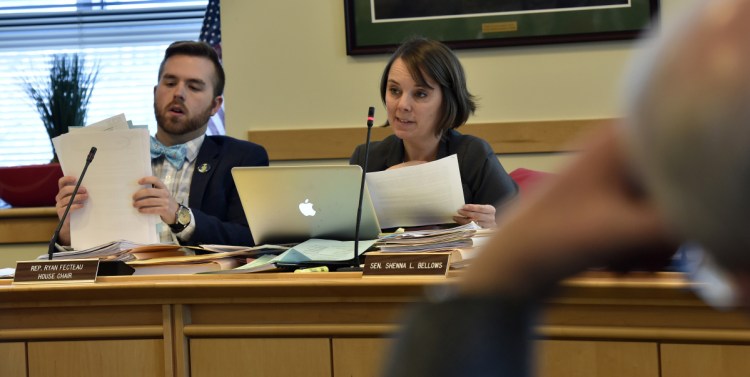The Maine Department of Labor has yet to respond to charges contained in an internal memo that high-ranking officials rushed a faulty unemployment filing system out for public use, ordered the destruction of records of complaints and pleas for help from Mainers trying to use the system to file for benefits, and left many of those people without benefits through winter.
State Sen. Shenna Bellows, D-Manchester, acknowledged on Friday that legislators, including those who sit on the Committee on Labor, Commerce, Research and Economic Development, have not heard from the labor department regarding the charges made public recently. The committee meets again at 1 p.m. Tuesday in the Cross Building in Augusta.
Neither has the labor department complied with multiple Freedom of Access Act requests from the Morning Sentinel for records and other information other than to acknowledge receipt of the requests.
Among those requests is information dealing with the company that created the software for the four-state consortium called ReEmployUSA that includes Mississippi, Maine, Rhode Island and Connecticut. The company’s history is littered with lawsuits and controversies, including losing out on a multimillion dollar unemployment insurance deal in Indiana.
The unemployment system software was developed by Tata Consulting Services, a multinational information technology company that is a subsidiary of global conglomerate the Tata Group, based in Mumbai, India. Tata was supposed to modify the system for Maine, the labor department employee who wrote the memo said, but the software still has buttons and tabs from Mississippi that aren’t relevant to Maine.
Mississippi spearheaded ReEmployUSA, funded by the federal government to the tune of $90 million. Based on documents provided by the Mississippi Department of Employment Security, an agreement between Tata America International Corporation and the Mississippi Department of Information Technology Services to modernize unemployment insurance systems was executed on Sept. 29, 2004, and was amended in 2013.
According to the contract, the project officially kicked off in January 2005, with the benefits system being implemented and the tax system completed in 2013.
Tata Consultancy Services has been embroiled in controversy, according to documents attached to the confidential Maine memo.
A nationwide class action lawsuit, filed by the San Francisco-based law firm Lieff Cabraser Heimann & Bernstein in 2006, charged that Tata workers were forced to sign over their federal and state tax refunds to their employer. The lawsuit, filed on behalf of all non-U.S. citizens employed by TCS in California between Feb. 14, 2002, and June 30, 2005, also charged that employees’ Indian salaries were wrongfully deducted from their U.S. pay. On Feb. 22, 2013, Tata agreed to settle for nearly $30 million.
Charleston County in South Carolina sued TCS for delivering botched software. The company won a contract to create an online tax system for $1.2 million, which was supposed to go online in the summer of 2004, but was plagued by delay after delay. The software was developed in the company’s offshore development center in Chennai, India, but was rejected by Charleston County after it failed to meet even basic requirements during user acceptance testing. TCS was sued and eventually agreed to pay back $1 million in a settlement.
A United States grand jury slapped two companies in Tata’s group — TCS and Tata America International Corp. — with a $940 million fine in a trade secret lawsuit. Epic Systems, a medical software company, accused Tata of “brazenly stealing the trade secrets, confidential information, documents and data” belonging to the Wisconsin-based company. In April 2016, the jury in Wisconsin found TCS guilty of illegally accessing Epic Systems’ data when working for a common client. Tata denied any wrongdoing. Last year, a jury cut that figure down to $420 million.
Tata has also been the target of accusations of discrimination. According to the Canadian Broadcasting Corporation in May 2013, TCS rarely hired skilled, experienced native Canadians at its Toronto offices, despite advertising open positions in Canada. TCS said that the company hired more than 125 Canadian workers in 2013, less than 1.2 percent of the 10,452 workers the company has outside of India
In 2015, a class action lawsuit brought against TCS in a San Francisco federal court by a United States information technology worker and former employee accused the company of discriminating against Americans by favoring people from South Asia for hiring and promotion.
The lawsuit claims that South Asians make up 95 percent of the company’s 14,000-person workforce in the United States. It charges that TCS engaged in discriminatory practices by sourcing most of its workforce through the H-1B visa program, which allows U.S. employers to employ foreign workers in specialty occupations. The suit charges that the company hired a disproportionate number of South Asians and favored South Asian employees in its human resource practices. At the end of December, a federal judge in Oakland, California, denied Tata’s request to dismiss the 2015 lawsuit.
In the early 2000s, TCS was outsourcing work to India while creating an unemployment filing system for Nebraska. At that time, a Nebraska congressman raised concerns over TCS developing similar software for New Mexico which was not fully operational when the company said it would be. The company refuted the claim, saying instead that the New Mexico labor department had not hired the right people to administer it.
Tata lost a $15.2 million unemployment-benefits contract in November 2003 in Indiana following intense criticism.
Colin Ellis — 861-9253
cellis@centralmaine.com
Twitter: @colinoellis
Send questions/comments to the editors.




Comments are no longer available on this story